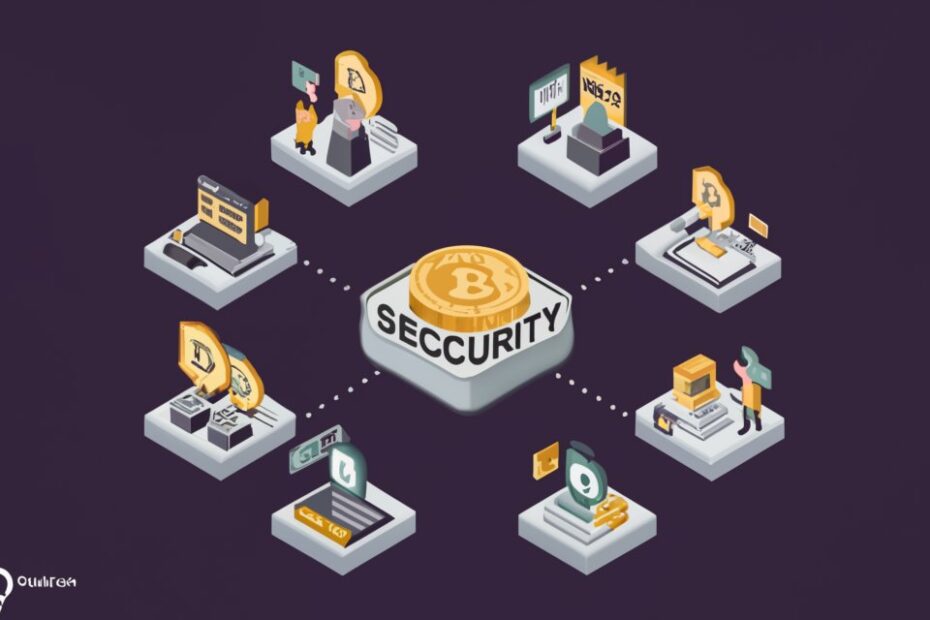As cryptocurrencies gain wider adoption, security has become paramount to protecting digital assets in an increasingly hazardous landscape. From Bitcoin’s inception over a decade ago, billions have been lost to hacks and fraud – underestimating these threats today can wipe out portfolios in an instant. This makes understanding best security practices imperative for navigating the crypto universe safely.
Introduction to Cryptocurrency Security
Cryptocurrency security refers to protective measures taken to secure crypto assets from unauthorized access or theft. Blockchains themselves provide a baseline of security through encryption and immutable distributed ledgers. However, vulnerabilities still exist at the wallet and exchange levels which hackers actively target to steal funds.
With cryptocurrency valuations reaching into the trillions, the rewards for compromising security are tremendous. Lack of adequate security has contributed to crypto losses now exceeding billions annually. As the industry matures, implementing robust security layers must remain a priority for further mainstream adoption.
Understanding Cryptocurrency Wallets
Cryptocurrency wallets enable users to receive, store and transfer digital assets. Wallets manage public-private key pairs – the public key, likened to a bank account number, enables receiving funds, while the private key allows spending through cryptographic signature. Wallets come in several forms:
Hot wallets stay connected to the Internet and facilitate transactions, but increased exposure raises hacking risks of private keys.
Cold wallets like Trezor hardware wallets detach private keys from the web into “cold” offline storage. More secure, but inconvenient for active trading.
Paper wallets have keys physically printed out for safekeeping from any malware. Setting up paper wallets requires rigorous security to prevent keyboard logging or camera capture of keys.
Securing wallet private keys remains imperative to control fund access.
Password Guidelines for Cryptocurrency Security
Private key protection starts with strong password practices – the first line of defense. Consider these tips:
- Leverage password manager apps like 1Password to generate lengthy, unique passwords across accounts.
- Enable two-factor authentication (2FA) using Authy or Google Authenticator for added login protection.
- For manual password creation, use 12+ character combos of upper/lowercase letters, numbers and symbols.
- Never reuse passwords across accounts or share them with anyone.
- Change passwords periodically and avoid using previous iterations again.
Vigilance around password hygiene increases safety.
Two-Factor Authentication for Cryptocurrency
Two-factor authentication (2FA) necessitates providing two forms of identity verification when accessing crypto accounts online:
- A password or PIN number (knowledge-based identification)
- An SMS code, software token like Authy, or hardware key (possession-based identification)
Activating 2FA across exchanges, hot wallets and crypto-related platforms provides an extra security barrier protecting users against password leaks. If one factor gets compromised, the attacker still requires the secondary factor to access accounts. All cryptocurrency holders should consistently use 2FA tools to enhance safety.
Best Practices for Storing Cryptocurrency
When not actively transacting, prudence dictates keeping cryptocurrency stored offline in “cold” hardware, paper or custodial wallets. Always maintain meticulous controls for these storage mechanisms.
Hardware Wallets – Devices like Ledger and Trezor enable secure offline private key storage and transaction signing. Safeguard hardware wallet PIN codes and passphrases which can restore access if devices are lost or damaged.
Paper Wallets – Printed paper wallets allow safely preserving private keys offline. Ensure printers and computers used to generate paper wallets are secure and wipe files after. Store completed documents safely in fireproof locations.
Custodial Cold Storage – Reputable third-party custodians like Gemini Custody add institutional-grade protections like multi-signature authorization, segregated account management and insurance coverage options.
Taking assets offline mitigates online attack vectors that threaten hot wallets.
Cryptocurrency Security Risks and Threats
Myriad risks persist, demanding diligence to avoid the growing mass of crypto fraud victims:
Hacking Attacks – Phishing links, compromised APIs, malware injections and wallet breaches remain prevalent, stealing billions in crypto to date. Exchanges still prove vulnerable despite security advances.
Investment Scams – From fake coin deals to Ponzi schemes, cryptocrime runs rampant. An FTC study found a median $1,900 lost from crypto investment scams from 2021-2022. Stay skeptical of guarantees and vet offerings thoroughly before investing.
Operational Errors – Simple mistakes have impacted even seasoned crypto veterans, like misconfigured smart contracts creating systemic loss. Redundancies and procedural rigor help minimize human error risks.
The adage “If it seems too good to be true, it probably is” remains apt when assessing crypto offerings. Assume heightened security mindfulness always.
Cryptocurrency Security Tools and Services
Myriad tools and protocols help secure crypto assets:
- Antivirus Software – Essential for detecting malware targeting wallet and exchange credentials. Windows Defender and Malwarebytes offer strong options.
- Virtual Private Networks (VPN) – Encrypt Internet connections to guard data transmission of any wallet logins or transactions from snooping or manipulation.
- Password Managers – Robustly generate and store secure passwords. Consider 1Password, LastPass, or open-source KeePass.
- Email Protection – Services like AnonAddy create alias email accounts to conceal actual accounts and block phishing attempts.
- Hardware Security Keys – Physical authenticator devices prevent account takeover attempts by requiring the device’s physical presence when accessing accounts.
No one tool creates a bulletproof crypto security solution, necessitating layers of complementary protections employed in tandem.
Cryptocurrency Security Regulations and Compliance
Government policies around cryptocurrencies remain under development as regulators strive to implement prudent guidelines balancing innovation, consumer protection and crime prevention. Most prominent currently are Anti-Money Laundering (AML) and Know Your Customer (KYC) regulations requiring exchanges to verify users.
Additional security compliance standards likely coming include:
- Mandated investor insurance coverage
- Required independent audits checking security controls
- Increased liability for exchanges regarding hacks
- Standardized custodial qualifications
Regulations will continue maturing to further legitimize cryptocurrency markets, increasing institutional investment. Proactively optimizing security boosts compliance readiness.
Institutional Cryptocurrency Security
Large crypto investments necessitate extensive security measures fitting their outsized value and fraud liability. Institutions like hedge funds, banks, and insurance firms have significant reputational and fiduciary interests in securing holdings properly by:
Multiparty Authorization – Requiring multiple signees for asset transactions boosts oversight and prevents internal theft.
Custodial Security – External custodians manage assets using cold storage protocols, insurance coverage, and investigative resources exceeding typical retail capacities.
Program Audits – Scheduled audits by reputable firms like Trail of Bits regularly assess vulnerabilities. Changes get made proactively rather than reactively.
Staff Vetting – Avoiding “inside jobs” requires vetting staff with access to wallet private keys to verify backgrounds and integrity to uncover red flags early.
Institutions further cultivate in-house technical security expertise for crypto-asset risk assessment and mitigation appropriate to investment scale.
Individual Investor Cryptocurrency Security
Retail crypto investors likely don’t custodially store billions in assets requiring institutional security. However, simple security steps remain prudent like:
Using Hardware/Paper Wallets – Keeping assets in cold storage minimizes attack surfaces for smaller holdings.
Securing Recovery Phrases – Safely store recovery phrase backups enabling restoration of hardware wallet access if devices get damaged or lost.
Learning Best Practices – Keeping current on latest threats and countermeasures prepares individuals against emerging social engineering schemes and technical exploits.
Monitoring Transactions – Tracking account activity consistently through explorer websites identifies suspicious transfers warranting prompt intervention.
Using Strong Passwords – Creating password complexity through reliable generators makes access credential guessing difficult for fraud attempts.
Seeking Mentorship – Turning to experienced traders or reputable communities can provide guidance for avoiding costly novice security mistakes.
Scaling security to appropriate levels is imperative regardless of holdings size.
Cryptocurrency Security and Taxes
Maintaining thorough cryptocurrency records enables accurate calculation of capital gains and losses for tax reporting purposes. However, losing access to crypto holdings from having inadequate security precautions in place can make historical transaction details irrecoverable.
Locked out investors still remain liable for all taxes owed based on blockchain records plus accrue interest and penalties for any late filings due to lacking accessible transaction histories. This makes designing a resilient data backup system imperative no matter what security breaches occur otherwise.
Prioritizing security simultaneously unlocks optimal tax planning opportunities and avoids significant penalties down the road per records requirements.
Conclusion: Security Across the Cryptocurrency Frontier
As cryptocurrency mass adoption progresses, asset security warrants elevated importance with so much at stake financially. Carelessness or negligence that enables hacks or theft can instantly nullify portfolio gains built over years. Treat cryptocurrency asset protection seriously – comprehensively applying the latest countermeasures and security controls while also remaining continually open to new innovations. Keep advancing security it parallel to the blockchain platforms depended on to prevent becoming another sad headline of fortune lost.
Frequently Asked Questions
What are the biggest cryptocurrency security threats now?
Hacking, frauds and scams targeting access credentials for wallets and exchanges pose the largest threats presently, extorting billions in crypto assets to date. Instituting resilient multifactor security access controls provides strong protection.
How is cryptocurrency stored securely offline?
Hardware wallets and paper wallets kept disconnected from the Internet in secure physical locations comprise “cold” offline storage options for cryptocurrency. Custodial vault services also segregate assets offline.
What happens if crypto wallet private keys become lost?
Losing private keys effectively makes cryptocurrency in those wallets permanently irretrievable still remaining recorded on the blockchain. New wallets must get set up to receive future transfers.
Should exchange-held cryptocurrency be moved into cold storage?
Leaving sizeable cryptocurrency holdings on exchanges risks loss from potential hacks. Historically billions have been stolen in exchange breaches. Moving holdings into cold storage hardware or paper wallets greatly enhances safety.
If cryptocurrency gets stolen, can it be recovered?
Recovering stolen cryptocurrency tends extremely difficult since blockchains permanently record transactions. Monitoring services attempt tracking transfers to off-ramps for asset recovery, but laundering obscures most funds quickly. Prevention remains imperative.
Which cryptocurrency security measures should be avoided?
Individuals should avoid creating “brain wallets” based solely on memorized passphrases which can get lost or guessed. Generating paper wallets on compromised machines also hugely risks private key capture from malware.
Who bears responsibility for securing cryptocurrency assets?
As no central authority governs cryptocurrency networks, security obligations ultimately fall upon the asset holder. This makes following best practices essential for investors and traders alongside adequately backing up account access credentials. Seeking trusted custodians can provide institutional-grade security support.

Eric Cook is a cryptocurrency expert and educator who has dedicated his career to teaching others about the intricacies of digital currencies and blockchain technology. He has extensive experience in the crypto industry and has been involved in the development and implementation of various blockchain-based projects.
